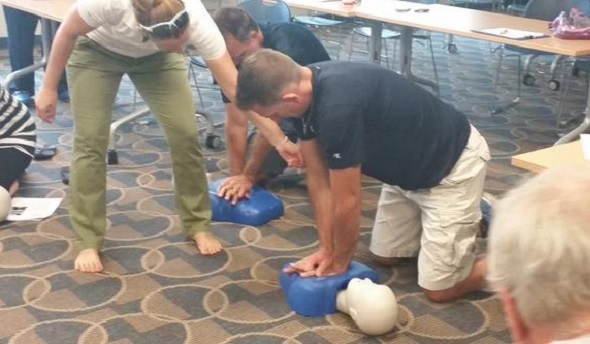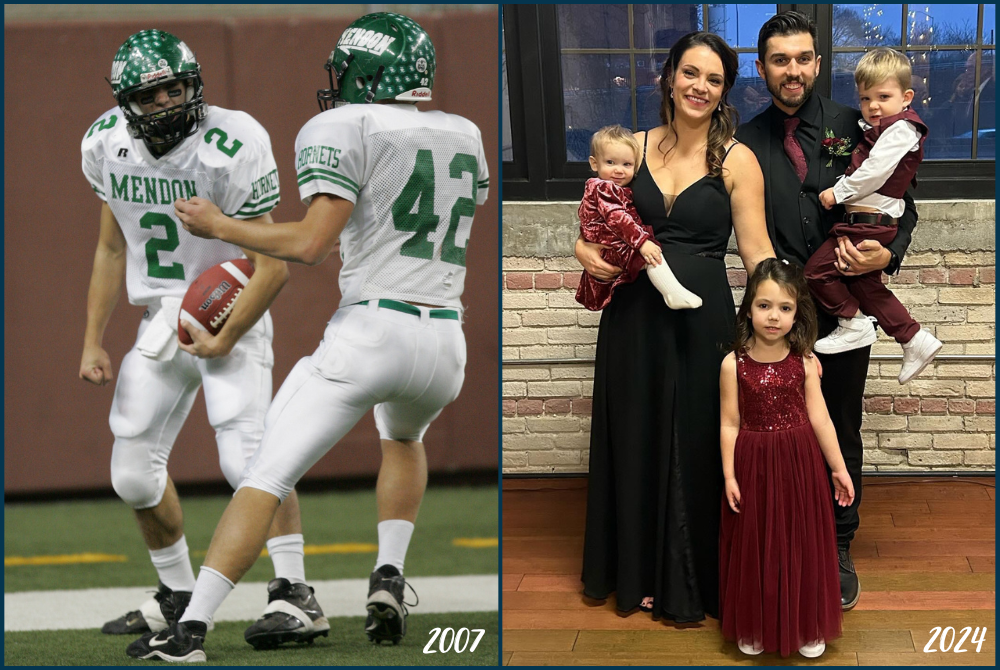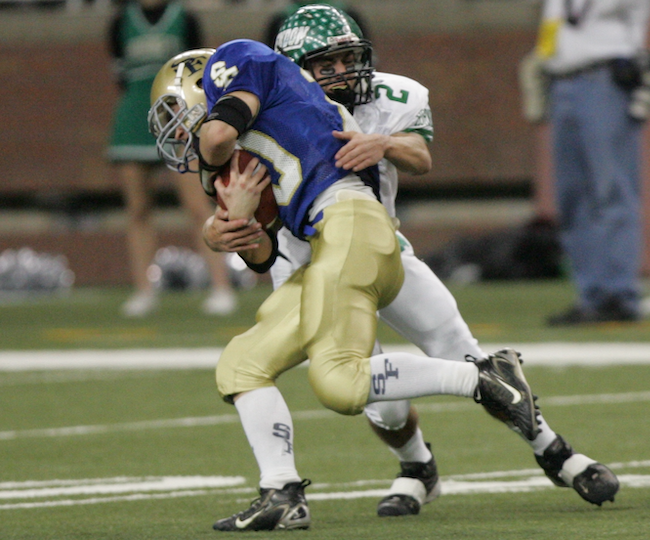
CPR Training, CAP Add to Preparedness
By
Geoff Kimmerly
MHSAA.com senior editor
October 12, 2015
A recent graduate from Ovid-Elsie High School named Chris Fowler started classes this fall at Michigan State University, his days representing the Marauders on the basketball court, football field and golf course now memories as he starts the next chapter of his young adult life.
But his story also will remain a reminder as his high school’s athletic department prepares each year to keep its athletes as safe as possible.
Three years ago next month, Fowler collapsed on the football practice field in cardiac arrest. The then-sophomore was brought back to life by two of his coaches, who revived him with CPR and an AED machine.
There’s no need for athletic director Soni Latz to recount the events of that day when explaining the importance of being ready to respond to a medical crisis – her coaches are well aware of why Fowler survived and understand completely why they too must be prepared.
“Everyone is very aware of what happened and the importance of being trained and knowing what to do, and actually feeling comfortable to step in and administer CPR when needed,” Latz said. “You can feel it’s never going to happen to you, but once it has, it makes you more aware and conscientious to be prepared.”
But Fowler’s story is worth noting on a larger level as varsity coaches at all MHSAA member schools are required this year for the first time to become certified in CPR, and as the largest classes in Coaches Advancement Program history begin course work that includes up to four modules designed to make them aware of health and safety situations that may arise at their schools as well.
The CPR requirement is the most recent addition to an MHSAA thrust toward raising expectations for coaches’ preparedness. The first action of this effort required all assistant and subvarsity coaches at the high school level to complete the same rules and risk minimization meeting requirement as high school varsity head coaches beginning with the 2014-15 school year.
The next action, following the CPR mandate, will require all persons hired as a high school varsity head coach for the first time at an MHSAA member school after July 31, 2016, to have completed the MHSAA’s Coaches Advancement Program Level 1 or Level 2.
In addition, MHSAA member schools this summer received the “Anyone can Save a Life” program, an emergency action plan curriculum designed by the Minnesota State High School League to help teams – guided by their coaches – create procedures for working together during medical emergencies.
“Coaches get asked to do a lot, and even if a school has an athletic trainer or some other health care professional, that person can’t be everywhere all the time. Coaches often are called upon to be prepared for (medical) situations,” said Gayle Thompson, an adjunct assistant professor at Albion College who formerly directed the athletic training program at Western Michigan University and continues to teach CAP sports medicine modules.
“The more (coaches) can learn to handle the situations that can inevitably arise, the better off they’re going to feel in those situations and the better care they’ll be able to offer their athletes. It’s proven that the faster athletes are able to get care, the quicker they’re able to come back to play.”
 Pontiac Notre Dame Prep – which has sent a number of coaches through the CAP program – began a focus on heart safety about five years ago after a student-athlete was diagnosed with a heart issue that allowed her to continue to play volleyball and softball, but not basketball. Athletic director Betty Wroubel said that prior to the student’s diagnosis, the school did provide training in CPR, AED use and artificial respiration; however, that situation put coaches and administrators further on the alert.
Pontiac Notre Dame Prep – which has sent a number of coaches through the CAP program – began a focus on heart safety about five years ago after a student-athlete was diagnosed with a heart issue that allowed her to continue to play volleyball and softball, but not basketball. Athletic director Betty Wroubel said that prior to the student’s diagnosis, the school did provide training in CPR, AED use and artificial respiration; however, that situation put coaches and administrators further on the alert.
Her school offers CPR training also to subvarsity and middle school coaches, using a combination of video instruction from the American Red Cross and in-person guidance by members of the school community who are certified to teach those skills. Students at the school also have received training – and it paid off a few years ago when one of them gave CPR to a baby who had stopped breathing at a local shopping mall.
Portage Central scheduled two sessions this fall for its coaches to receive not only CPR certification, but AED training as well. Central was fortunate to have an American Red Cross first-aid trainer in house, teacher Rachel Flachs, who also is close to the athletic side as the girls swimming and diving coach at Mattawan High School.
Central athletic director Joe Wallace said the training was offered not just to varsity head coaches, but every head coach on every level of the program so that “at least we know that at every given practice, every game, we’d have someone recently trained,” he said.
And he was proud of how his coaches immersed themselves in the subject matter.
“They were putting themselves in scenarios to see how it related to their own sports and asking really great questions,” Wallace said. “It was thought provoking.”
The CAP sports medicine modules are designed to do the same as coaches consider the medical situations they could face. They aren’t designed as “medical training,” said Tony Moreno, a professor of kinesiology at Eastern Michigan University and teacher of all four CAP sports medicine modules. Rather, attendees receive an awareness and basic education on common injuries, injury mechanisms and prevention, and how to create an action plan in the event of an injury incident.
The CAP program touches on a variety of safety topics in several of the available seven levels of coach education.
CAP 1 – which is part of the mandate for new coaches beginning next school year – includes “Sports Medicine and First Aid.” Cap 4 has modules titled “Understanding Athlete Development” and “Strength and Conditioning: Designing Your Program.” CAP 5 includes the session, “Peak Health and Performance.” Attendees also have the option of receiving CPR and AED training as an addition to some courses.
With a quick Internet search, coaches have no trouble finding a variety of resources on sports medicine, performance enhancement, nutrition and healthy living regarding young athletes. “However, some of these sources are more credible and scientifically-based in comparison to others,” Moreno said. “CAP strives on an annual basis to continue to update and improve the quality and credibility of this information and in a face-to-face manner where coaches have the opportunity to ask questions about their experiences and specific programs.”
“Having the CAP requirement will only make them better informed. Many have had this kind of information before, but there’s always something new coming,” Thompson added. “I think we do a good job, not of trying to tell them they were wrong, but maybe taking what they’ve known a step further and making them better prepared – empowering them to do their best.”
Wroubel may understand more than most athletic directors the growing list of tasks coaches are asked to accomplish; she’s also one of the winningest volleyball and softball coaches in MHSAA history and continues to guide both Fighting Irish programs.
But she and Wallace both said the CPR mandate isn’t considered another box to check on a to-do list; there’s enthusiasm because of its importance and the opportunity to carry those skills into other areas of community life as well.
Wroubel has served as a coach since 1975 and said this renewed emphasis on coaches having knowledge of sports medicine actually is a return to how things were when she started. Back then, coaches were responsible for being that first line of medical know-how, from taping ankles to providing ice and evaluating when their athletes should make a trip to the doctor’s office.
“When I first started coaching, we didn’t have sports medicine people, trainers, or team doctors other than for football. You did everything yourself,” Wroubel said. “I think everybody got away from that, but I think it’s coming back because a trainer can’t be everywhere.
“It’s healthy and it’s good for kids. … The more of us with emergency skills, the better we’re able to serve our community.”
PHOTOS: (Top) Portage Central coaches receive CPR training earlier this fall. (Middle) Pontiac Notre Dame Prep coaches practice during AED training. (Photos courtesy of school athletic departments.)

Nightingale Embarking on 1st Season as College Football Head Coach
By
Scott Hassinger
Special for MHSAA.com
July 10, 2024
CJ Nightingale's family values, small-town upbringing and Christian faith steered the Mendon native into a career coaching college football.
 Nightingale, a 2010 Mendon High School graduate, is busily preparing for his first season as Belhaven University's eighth football coach. He was officially named the Blazers' head coach seven months ago, on Jan. 1.
Nightingale, a 2010 Mendon High School graduate, is busily preparing for his first season as Belhaven University's eighth football coach. He was officially named the Blazers' head coach seven months ago, on Jan. 1.
Belhaven, a Division III school located in Jackson, Mississippi, competes in the USA South Athletic Conference.
Nightingale credits his love of coaching to his father Chris Nightingale and grandfather Charles Nightingale.
"It all started with my dad and grandfather. At one time they were both involved in coaching, and their general love for sports wore off on me," CJ Nightingale said.
Once CJ reached high school, his interest in athletics only intensified thanks to several people who made a big impact on him.
"I had the most wonderful experience attending school and participating in Mendon athletics,” Nightingale said. “We didn't always have the better athletes, but we were successful because of all the time and commitment put in by our coaches, teachers, administration along with parental and community support. Success is the result of many people who focus on the same cause."
Nightingale lettered in football, basketball and baseball at Mendon, earning four varsity letters in all three sports. He was named the St. Joseph Valley League's MVP in all three sports his senior year, and Mendon earned league titles in all three during Nightingale's senior year as well.
As a starting quarterback and defensive back his sophomore year, Nightingale led Mendon to the 2007 Division 7 football championship with the Hornets' 20-0 win over Traverse City St. Francis. Nightingale still holds the state record for career interceptions with 27.
Mendon had finished the 2006 season 3-6. A losing season remains rare in Mendon, and Nightingale stated it fueled the Hornets' title run the following season.
"I think losing is more difficult in football than in any other sport because of how much work goes into preparing for a season,” Nightingale recalled. “We were a very young team in 2006 and got punched in the mouth. It wasn't the best feeling, but it was a real learning experience and served as a big driving force that next season.
"All the hard times we endured the previous year served as a byproduct for our success in 2007. That team was unselfish, and not one player on the team cared who got the stats or accolades."
𝐖𝐞𝐥𝐜𝐨𝐦𝐞 𝐭𝐨 𝐉𝐚𝐜𝐤𝐬𝐨𝐧, 𝐂𝐨𝐚𝐜𝐡 𝐍𝐢𝐠𝐡𝐭𝐢𝐧𝐠𝐚𝐥𝐞!
Belhaven Athletics is excited to welcome Coach CJ Nightingale as the eighth Head Football Coach in program history
📰 | https://t.co/bZO6Jz16Fa#GoGreen | #d3fb | @BelhavenFB pic.twitter.com/lfQloZxVcD
— Belhaven Blazers (@BelhavenBlazers) December 31, 2023
At Mendon, Nightingale played for legendary coach John Schwartz in football, David Swanwick in basketball and Glen Samson in baseball.
Lessons from Schwartz – a member of the Michigan High School Football Coaches Association's Hall of Fame – and Samson have especially stuck with Nightingale into adult life and his own coaching career.
"Coach Schwartz had a way of getting everyone on the same page not just on the field, but he taught you how to be the best version of yourself off the field in every-day life. Coach Samson knew how to get his players in the right positions on the diamond to make us successful," Nightingale said.
"The environment at Mendon solidified my desire to become a coach and teacher. The best leaders are also the best teachers, and when you are surrounded by people like that it makes a big difference."
Nightingale attended Wheaton College in Illinois, where he lettered in football four years as a defensive back and return specialist. During Nightingale's career, the Thunder posted a combined record of 34-8 and qualified for the NCAA Division III playoffs when he was a freshman.
After graduating college, Nightingale taught history and spent two years as the varsity football coach at Richmond High School in Indiana. In 2016 he secured his first collegiate coaching job at Greenville University (Ill.) as a defensive backs coach, where he spent one season. He then served as special teams coordinator and linebackers coach at Indiana Wesleyan University beginning in 2017 before returning to his alma mater Wheaton in 2019 as the Thunder's defensive coordinator and defensive backs coach.
 Nightingale coached 24 all-conference players, 10 all-region performers and seven All-Americans over his four seasons at Wheaton, and the Thunder made the Division III playoffs all four years.
Nightingale coached 24 all-conference players, 10 all-region performers and seven All-Americans over his four seasons at Wheaton, and the Thunder made the Division III playoffs all four years.
The head football coaching position at Belhaven became available in December 2023 when previous coach Blaine McCorkle moved on to Division 1 Northwestern State (La.). Nightingale applied and went through a three-week interview process before being selected as the program’s next head coach.
"I truly feel like God has called my wife Shanel and I and our family here for a reason. We are going to pour into Belhaven as deeply as we can and see what life brings us,” CJ Nightingale said. “As a college football coach, you have the unique chance to pour into your players spiritually, academically, athletically and socially. That's what is really special about this profession."
Belhaven's program has enjoyed a lot of success, especially the past three seasons with a combined 24-7 record, including a 9-2 finish last fall.
"I am very fortunate to be taking over a strong program here at Belhaven. You don't sustain success, but rather you must be able to build on it," Nightingale said. "We are excited about this season after a great spring. This group of coaches and players got a lot done these past six months. We have had a lot of guys here on campus all summer working to get better. There are lot of goals in front of us that haven't been achieved yet. Two of those goals are to go undefeated in conference play and host a playoff game.”
CJ and Shanel have three children, including 5-year old daughter Charlotte, 3-year old son Trey and 14-month old daughter Coco. They are expecting a fourth child in mid-September.
2024 Made In Michigan
June 28: E-TC's Witt Bulldozing Path from Small Town to Football's Biggest Stage - Read
PHOTOS (Top) At left, Mendon’s CJ Nightingale (2) celebrates during his team’s 2007 championship win over Traverse City St. Francis at Ford Field; at right Nightingale is pictured with his wife Shanel and children Charlotte, Trey and Coco. (Middle) Nightingale makes an open-field tackle against the Gladiators in the 2007 Division 7 Final. (Family photo courtesy of CJ Nightingale.)

